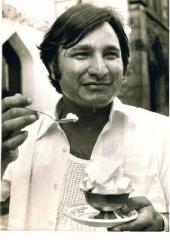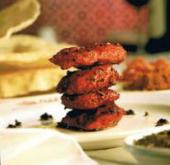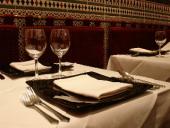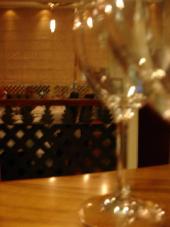The Shish Mahal - the West End's Indian dining legend
66-68 Park Road, Kelvinbridge, Glasgow G4
telephone: 0141 334 7899; 0141 339 8256; 0141 334 1057
 No serious conversation about Glasgow Indian restaurants, and particularly those in the West End, can fail to include a reference to the Shish Mahal, the business founded 42 years ago by a young entrepreneur called Ali Ahmed Aslam. A special treat for West Enders and what has become a worldwide following for all that time, it may have moved from its original site around ten years ago to its present-day site in Park Road, but its devoted admirers reckon it has lost nothing of its innate appeal.
No serious conversation about Glasgow Indian restaurants, and particularly those in the West End, can fail to include a reference to the Shish Mahal, the business founded 42 years ago by a young entrepreneur called Ali Ahmed Aslam. A special treat for West Enders and what has become a worldwide following for all that time, it may have moved from its original site around ten years ago to its present-day site in Park Road, but its devoted admirers reckon it has lost nothing of its innate appeal.
In this special feature Roy Beers takes a lingering look at an undoubted star of Britain's Indian restaurant capital.
From Super Ali to the present day
Reading even a concise history of that enduring Glasgow Indian restaurant tradition, the Shish Mahal, is enough to convey the definite impression that the business run today by Mr Raishaid Ali, third generation of his family to do so, is the product of an authentic great city dining dynasty.
Quite simply it's a jewel which, according to its legions of fans, has never lost its lustre.
The restaurant's fame among curry-loving Glaswegians is arguably unmatched, even in a modern city dining circuit which boasts some truly excellent exponents of the art of Indian cuisine. Some veteran Shish fans - who have been dining in the restaurant for three decades and counting - liked the style of dish they were served back in the 70's so much that exactly the same items are still there on the menu, served in pretty much the same way they have always been.
But what was once a very tight selection of dishes (echoed in other Indian restaurants all over Glasgow) has now evolved into something infinitely more complex and imaginative - sophisticated, in fact - and it continues to change with the addition of small but significant refinements as Mr Ali and his family gain fresh inspiration from their regular trips to the sub-continent. This, to him, is an important point, because for his family (of which more in a moment) the Shish isn't a tribute restaurant or a themed restaurant - it's the real deal, an extravagant exemplar of all that is wonderful about a cuisine which has as its staple "the curry", but which also has a great deal more to offer. It is a Glasgow embassy for the finest Asian cuisine, in the family's view, not a recitation of somebody else's past achievements.
 First time visitors are, Raishaid Ali says, generally impressed, even if they're wholly unaware of the restaurant's immortal place in the city's dining lore.
And oddly enough, in a city where tourism (particularly conference tourism) is booming, it tends to be French or Spanish visitors who are most bowled over.
"Glaswegians generally have a far more sophisticated palate now than was the case in our early days," says Rashaid Ali, "while in France, for example - which has some wonderful North African and other restaurants - Indian food isn't really well known. Some dishes which French people find amazing because of their flavour and complexity are 'plain sailing' for local people."
First time visitors are, Raishaid Ali says, generally impressed, even if they're wholly unaware of the restaurant's immortal place in the city's dining lore.
And oddly enough, in a city where tourism (particularly conference tourism) is booming, it tends to be French or Spanish visitors who are most bowled over.
"Glaswegians generally have a far more sophisticated palate now than was the case in our early days," says Rashaid Ali, "while in France, for example - which has some wonderful North African and other restaurants - Indian food isn't really well known. Some dishes which French people find amazing because of their flavour and complexity are 'plain sailing' for local people."
The restaurant itself, in Park Road, is on the site of what was once the Taj Mahal restaurant. The original Shish Mahal was on Gibson Street, and had to move after subsidence caused structural damage. But the history lesson - concise version - begins in 1959 with the founding of Green Gates on Bank Street by Rashaid Ali's grandfather, Noor Mohammed. It was a favourite haunt of students, not least because of its low prices, a popularity expanded upon in the new restaurant across the road by his son, Ali Ahmed Aslam - better known to innumerable customers over the decades as "Mr Ali". His original restaurant was, by today's standards, a modest proposition; it was a hands-on concern where everybody worked at full tilt - at one point, Raishaid Ali's grandmother, Sahra, made the chapatis - and the place was never less than heaving at weekends. It was 1964, the Beatles were providing a populist contrast to the Beatniks, Vespa scooters were "hip" - so was smoking - and Glasgow was definitely ready for a new dining sensation.
It was around this time, too, that Nasim Ahmed, younger brother of Ali Ahmed Aslam, joined the business. A few years later, in the days of universal long hair and flared trousers, the Shish Mahal was still a fast-paced, gregarious, even exotic place to be - given that the nearest supermarkets had then got to Asian cuisine was the diabolical Vesta curry. Real Indian food was simply the most exciting thing which had ever happened in Scottish restaurants up to that point, and if it was a distinctly home kitchen affair in those early days it was still perennially good: it wasn't that unusual to see people queuing for tables at busy times. Later the restaurant became a more polished act, but it never lost it bonhomie or charm: everyone was made to feel important.
Looking down Gibson Street today there are still plenty of interesting restaurants, but no longer are any of them Indian. The Shish Mahal, at various times, shared the street with the Maharajah, the Himalaya and (more recently closed) the Shalimar and the Koh-i-Noor (which famously collapsed into the River Kelvin): all have moved or are long since closed.
So while there are Indian restaurants in abundance around Glasgow, with some of the best trading in the West End, the Shish Mahal is the only survivor of the original Gibson Street/Woodlands ventures - and, of course, it hasn't manage to survive and flourish simply by ploughing the same old furrow.
The Shish Mahal and its menu
The original Shish Mahal, regular diners at the Glasgow version will be aware, was the Mirrored Palace (sometimes translated as crystal or glass palace) built by the great ruler Shah Jahan for his bride Nur, a magnificent building which embodies all the romance, opulence and mystery of the mighty Mughal (or moghul) Empire. Among the actual palace's special features are sections of mirrored glass built into the interior fabric, which provides a magical, shimmering effect as they capture and reflect the light.
Today's restaurant has as its decor theme a stylish contemporary take on classic Asian design motifs, within a colour scheme which manages to be vibrant but not garish - it's smart, and welcoming, but certainly not formal in the old-fashioned sense.
 Relaxing there at a sparklingly nicely set-out table diners can either order their old favourites, without a second glance at the rest of the menu or ... sit back and have a good long think about which dishes they should definitely try, as opposed to the ones they might just like to try.
Relaxing there at a sparklingly nicely set-out table diners can either order their old favourites, without a second glance at the rest of the menu or ... sit back and have a good long think about which dishes they should definitely try, as opposed to the ones they might just like to try.
There are literally dozens of options, all of them unique creations, and while the Shish Mahal, like so many Glasgow restaurants, is a product of the Punjab, many dishes are inspired by specific regional styles - for example the fruity-sweet influences of Kashmir, or the fish and coconut staples from Goa. The Shish also has a whole section of burryani (a classic rice and meat dish) entrees inspired by the Mysorean city of Hyderabad, while on a tour of India Rashaid particularly enjoyed discovering a great Mumbai favourite using king prawns with sweet pineapple.
Before plunging into details of the menu, however, he makes an important point.
He adds: "You are talking about a sub-continent with about 1.3 billion people, with an almost limitless cuisine - so it always has been and always will be about contrast and evolving tastes - it doesn't stay exactly the same, as we constantly discover, and neither do we, even if there are many things we simply will not change and would not dream of changing."
However there does appear to be something distinctive about the Shish Mahal's particular approach.
"Many people cook curries at home now," says Rashaid Ali, "and in fact it's the most popular food in Scotland." He adds: "But many of our customers are good enough to tell us it is never quite 'the same' as we do it - and of course making our food 'special' is a huge part of what we are all about."
Catering has become a hugely more rigorous task than it ever was before, with increasingly tough new regulations to observe, and it perhaps goes without saying that the Shish likes to think that it runs a very tight ship in this regard.
However the answer to anyone who wonders how one restaurant can provide so many dishes to order is simply "experience". Many of the staff have been with the business for at least ten years, and the Shish prides itself on employing some of the best chefs in the business.
About 60 per cent of customers are "regulars", and in some but not all cases that also means their menu choices are regularly the same, and to many there is simply no alternative to the restaurant they've enjoyed year after year for decades - some, we're told, even scorn at the suggestion of going anywhere else. Recent good reviews have included the Evening Times and The List magazine's eating and drinking guide.
 Raishaid Ali is very firm on one point, however. While the old Shish could justifiably have been called "a curry house" in its early days today's business is a full-on restaurant, and make no mistake. The staff (about 16 at full stretch) are all smiling, but they're running one of the most formidable Asian catering acts on the circuit, and every aspect of cuisine, presentation and service is taken deadly seriously. All the customers have to do is enjoy it, not call it a curry house, and come back as often as they like.
Raishaid Ali is very firm on one point, however. While the old Shish could justifiably have been called "a curry house" in its early days today's business is a full-on restaurant, and make no mistake. The staff (about 16 at full stretch) are all smiling, but they're running one of the most formidable Asian catering acts on the circuit, and every aspect of cuisine, presentation and service is taken deadly seriously. All the customers have to do is enjoy it, not call it a curry house, and come back as often as they like.
One of the restaurant's specialities is tandoori cooking, and it's just possible the Shish may have had the first tandoor (clay oven) in Scotland - and today's tandoori speciality cuisine is, says Raishaid Ali, the result of many years careful development of the concept: the Shish Tandoori Mixed Platter is perhaps as good a place to start as any - unless you fancy a burryani (often spelled biryani), karahi layllpuri Lakashmie (Bhatti) ... the list appears endless, and, Raishaid Ali insists, every dish is special.
The ingredients help, of course. The restaurant's prawns are imported from India ("they're bigger, and also a lot tastier"), and so, for example are the mangoes.
"We pay a fairly heavy price premium for several ingredients, but it is definitely worth it," said Raishaid Ali.
One arguably impressive menu listing is the very simple "bowl of yoghurt" (the Dahi of former years) which many Indian restaurants now disdain to serve. In the Shish it is still there for people who enjoy the ancient North Indian style of using yoghurt instead of water to cool the palate, and who enjoy the contrast of flavours and consistencies.
But that is about as simple as things get. The starters list alone runs through many different kinds of pakora and samosa to the spicy Chicken Tikka Achari (the concept of chicken tikka was also greatly advanced by the Shish Mahal), Japanese style king prawns, and numerous varieties of poori - light, fluffy pancakes cooked with anything from prawn or chilli chicken to potato and spinach (aloo saag). There are five regular choices of soup, of which one of the most interesting is certainly Garam Daal and Coconut; and by way of accompaniment to the main meal there's a predictably wide range of tandoori breads and pratha - bread cookery in Indian cuisine is a specialist art which can make or break a great meal, and at the Shish it is no mere afterthought.
The mains options, as noted, can be a little bewildering to the uninitiated. Mr Ali's Old Favourites are all there - chicken dansak, lamb rogan josh, chicken Madras, and so forth - and there's even a sizeable section of European cuisine along traditional lines, including the time-honoured Chicken Maryland. Even in this section, however, there are one or two surprises - for example poached spicy haddock fish, which is tipped as a particular treat for anyone on a rigorous or diabetic diet; or there's the option of a Pakistani-style omelette, said to be particularly popular in the great Punjabi city of Lahore.
The star of the tandoori specialities mains is Jhinga Tandoori, featuring those extra-large Bengal tiger prawns, but the barbecue art also extends to Turkish style kebabs and Boti Kebab - a take on the shashlik kebab created from pieces of steak, peppers, tomato and onion.
From this point in the menu things get very exotic indeed. Rashaid Ali singles out as particularly noteworthy the Khadey Masala Ka Salan selection - a bit of a tongue twister, this - of raw meats simmered in a rich gravy of whole spices, tomatoes and onions; Karishma dishes, cooked with freshly chopped mixed nuts; and a selection of Punjabi bhoona dishes prepared to a style called Nashedar Banjara. Then we have Chilli Basaar, a variant on the usually mild patia style designed for slightly hotter palates; a rich-flavoured selection of Lal Pari bhoona dishes; and Dhahi Deghie cuisine (which as the Dhahi, or dahi, suggests, includes yoghurt together with roasted coriander). Amrat Mirchi Punjabi Khoya, meanwhile, is meat or vegetables simmered in coconut and spices led by cinnamon, cloves and cardamom: these are the classic spices in a korma, or quorma, but this style is not mild at all, and is served medium to hot.
Besides the old favourites bhoona dishes there is a whole separate section of new dishes devoted to this style, with its tomato-rich sauce; and also a discrete selection of milder patia dishes.
Another substantial section is devoted to the Karahi style (ie, dishes cooked in a karahi pot), including, unusually, a tuna steak karahi; while for the sort of palate which cannot tolerate fiery spices a star of the Moghul's Delectation selection is the Makhani (very extra mild), whose sauce includes an infusion of lemon and mango juice.
This section also includes regional dishes such as Multani Chasni (ie, pertaining to the city of Multan in the Punjab); and Bangalore - fresh Pacific shrimp in a sauce based on yoghurt and mint.
Vegetarians are spoiled for choice, too, with a selection spanning everything from vegetable kofta and numerous takes on the Daal curry (also sometimes spelled Dhall or Dall) to Channa Saag Bhaji, chickpeas and spinach simmered in a condensed curry sauce. Really it wouldn't be stretching it to suggest that the Shish Mahal's vegetarian selection offers more choice than many actual vegeterian restaurants.
One way of avoiding a headache as you sift the umpteen menu choices available (and I have only really touched on some of the main sections) is to go for a set meal option: there are three set menu choices each for two sharing and for parties of four - of which the dearest (for four) is still only a shopper-friendly £60.95. And, yes, there's a vegetarian set menu also available upon request.
The Shish and the Future
"Mr Ali" remains the "godfather" of the Shish Mahal, but Raishaid Ali jokes that he is already preparing the fourth generation with his baby son, Ehysa Noor Ali, whose name honours Mr Ali, Noor Mohammed and - a great prophet in Islam - Jesus. The point he is making is that the Shish and its family are now as much a part of their city fabric as the River Kelvin, a living tradition which - in a world of fickle tastes and changing fads - counts for a great deal to diners who know them as friends as much as hosts. In years to come Rashaid expects the restaurant to keep its very best attributes while continually developing new spins on classic Punjabi and other Indian regional cuisine.
"The three core elements which make us a great restaurant for many people are the service, the food, and the drink," he says. "If we get one of those wrong then the rest of the experience is spoiled. I may have customers who have come here for many years but I also have people who are visiting for the first time, and I want them to come back too: one less than perfect meal and they may simply never return. I can't let that happen!"
Wine and the Shish
It's perhaps fair to suggest that in the past wine has been a less than impressive offer at many Indian restaurants, but here there is both a strong selection of the main wine-producing countries and also a definite attempt to match particular wines considered to complement Indian cuisine - which is an art in itself.
Raishaid Ali says: "We're still finding that some drinkers are a little hidebound by what they think they know and enjoy, whereas of course there's a big difference between, say, a great Shiraz and one you might buy for a few pounds in the supermarket. But that's changing too. We've assembled our list with the help of real connoisseurs, and it's very much part of the main offer. We like to think we're advancing the concept of good wine with Indian food with our selection."
Wines reckoned to particularly complement spicy food include Finca Antigua Blanco from La Mancha (Spain 2004) and Chateau Ste Michelle Pinot Gris from the USA's Washington State (2004) - but that could also hold true of the Bulletin Place Shiraz from Australia (2003); or the "incredibly rich and intense" Masi, Costasera Amarone from Italy (2001).
Taking the Shish Home
The great time-honoured Glasgow option of dining at home, either with friends or family, is well catered for. You can order as late as 11.45pm (but try to make it earlier), and you can 'phone in the order ahead too. There's a 10% discount on menu prices on orders under £20, and a 20% discount on orders over £20.
Shish Essential Details
Shish Mahal, 66-68 Park Road, Kelvinbridge, Glasgow G4
telephone: 0141 334 7899; 0141 339 8256; 0141 334 1057
opening times: Monday - Thursday, noon to 2pm; 5pm - 11pm.
Friday, Saturday: noon - 11.30pm
Sunday, 5pm - 11pm






